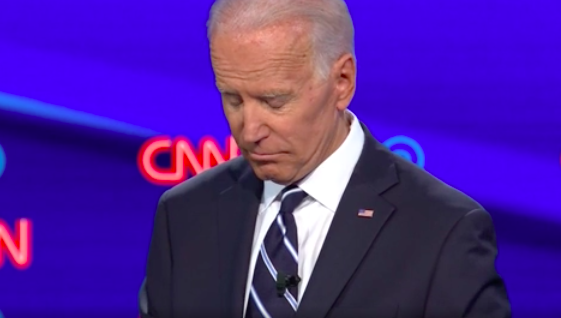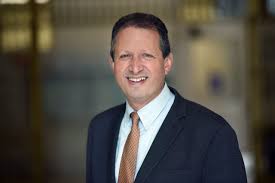
DETROIT, Mich.—Labor issues were a minimal part of the agenda at the second night of the Democratic presidential debate here July 31.
The two candidates making unequivocally pro-union statements were Washington Gov. Jay Inslee and New York Mayor Bill de Blasio, who are both hovering around asterisk levels in the polls. Inslee, who has made the climate crisis the central issue of his campaign—in his closing statement, he said “the survival of humanity depends on it”—said his “national mobilization” to convert the U.S. to renewable energy would create “8 million good union jobs.”
“This has to be the party of labor unions. This has to be the party of universal health care,” de Blasio said.
The discussion of health care yielded far more mudslinging than clarity. On the debate’s first night, the arguments for and against the Medicare for All bill were harsh but had some substance, such as whether a public single-payer system would help or hurt union members who have good insurance. On this night, most of the ten candidates appeared to agree on some vague mix of “public option”—letting people buy Medicare coverage—and private insurance. They denounced insurance companies’ profiteering while insisting on retaining private insurance, and slung epithets like “double-talk” and “simply inaccurate” at each other.
Both Sen. Kamala Harris of California and Sen. Cory Booker of New Jersey, who have cosponsored the Medicare for All bill, said they want to retain private insurance. Former Vice President Joseph Biden charged that Harris’s plan would cost too much, proposing adding a public option to the Affordable Care Act. Harris responded that Biden’s plan would leave millions of people without insurance, and there was “no excuse” for that in 2019.
Harris, Booker and former federal housing secretary Julian Castro all called their public-private programs “Medicare for all.” Sen. Kirsten Gillibrand of New York, Rep. Tulsi Gabbard of Hawaii, and possibly de Blasio appeared to be the only ones backing the actual Medicare for All legislation. Tech entrepreneur Andrew Yang, whose campaign is almost entirely centered on his proposal for a $12,000 a year guaranteed minimum income, said that the current system of employers providing insurance is both a costly burden on businesses and a chain tethering workers to their jobs.
Lost in all this—possibly also due to the 60-second limit on candidates’ speaking time—were details on how these proposals might work. How much would public-option insurance cost per month, and how much would deductibles and copays be? Biden said his plan would have a $1,000 deductible and limit people’s total medical expenses to 8.5% of their income.
Gov. Inslee signed the nation’s first “public option” program into law in May, but it actually involves the state contracting with insurance companies to offer plans, and it is not expected to reduce premiums by more than 5-10%. Inslee didn’t have time to explain any further.
Much of the mudslinging was prompted by the moderators, who often asked one candidate to criticize another. At one point, CNN’s Jake Tapper interrupted a discussion of the police killing of Eric Garner to reopen the Biden-Harris argument over school busing in the 1970s that provided a viral moment in the June debates.
Inslee has released a lengthy proposal on labor issues that includes a $15-an-hour minimum wage, prevailing wage for all federal contractors, expanding the right to join unions to all workers, and requiring “just cause” (“legitimate, performance-related reasons”) to fire workers. His climate-change program advocates “achieving 100% clean energy in electricity, new vehicles, and buildings over the next 10-15 years” with a $25 minimum wage, access to a union, and benefits. It also promises a “G.I. Bill” and “wage loss supports” for workers in fossil-fuel industries or others who lose jobs in the process of “decarbonizing the economy.”
De Blasio is also calling for a law to require just cause for firing workers, as well as two weeks’ paid vacation and a minimum wage for independent contractors.
The minimal discussion of labor issues came mainly in the sections on climate change and the economy. CNN’s Dana Bash asked Gillibrand if the Green New Deal proposal for guaranteed jobs with paid vacation was unrealistic. Bash also asked Julian Castro if raising taxes to pay for health care would hurt the booming economy. He said it’s not booming for people losing jobs at General Motors or homeless people, and that fast-food workers need a $15 minimum wage.
The debate then segued into women being paid less than men, with Harris proposing fining corporations 1% of their profits for every 1% difference in what women and men get paid.
Inslee said the bigger scandal is that predominantly female professions such as teachers and nurses are underpaid, adding that Washington raised teachers’ pay last year.
“We’ve increased our union membership 10%,” he added. He got cut off before he could say more.
Meanwhile, 11 miles away in Detroit’s northern suburbs, less than 24 hours remained before General Motors’ Warren Transmission Operations plant was scheduled to close, terminating the jobs of the 260 workers left there.



